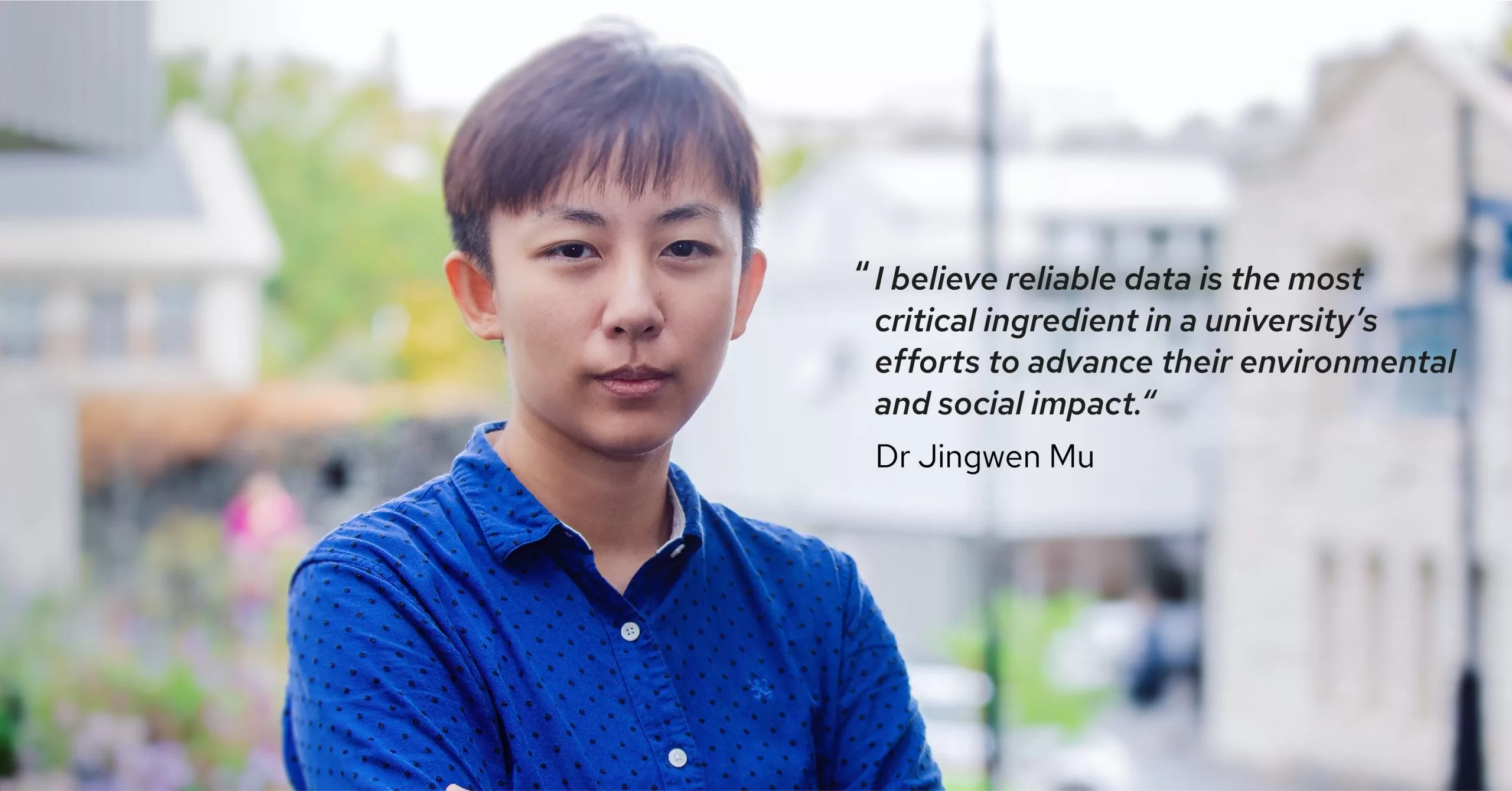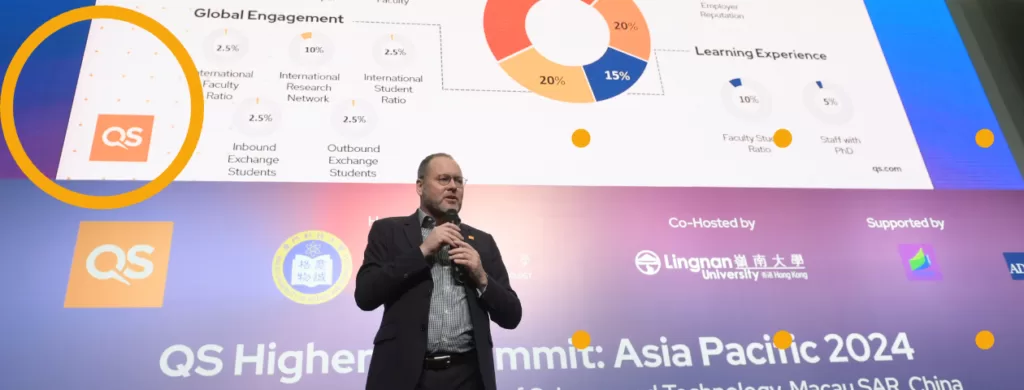
On 26 October 2022, QS will be launching the QS World University Rankings: Sustainability.
Inspired by the Environmental, Social and Governance (ESG) framework – a set of standards for businesses and organisations to ensure that they are environmentally and socially responsible – these new rankings serve as an impetus for action and change in the higher education sector.
Institutions will be assessed according to their efforts to advance environmental and social sustainability, as well as their wider impact in these areas.
To mark the launch of the rankings, we spoke with the Strategic Planning Manager, Dr Jingwen Mu of the University of Auckland.
Dr Mu devotes her career to driving strategic commitment within institutions – ensuring that universities remain relevant and integral to society and committed to progressing the UN Sustainable Development Goals (SDGs). Dr Jingwen Mu is now also the Senior Global Strategy Advisor to the Vice-Chancellor at the University of Auckland, and the newest QS Advisory Board member.
-
As part of your role as the Strategic Planning Manager at the University of Auckland, what steps have been taken towards addressing the SDGs at the institution?
As the Strategic Planning Manager, I worked with the team to create the university’s first SDG Report series. We collect evidence from across the university and report on all 17 SDGs in terms of our teaching, research, engagement and operational activities. Through this, our students and staff started to develop an understanding of the relevance of their work and footprint on the sustainability goals.
Heightened awareness comes with high levels of interest and the willingness to assume more responsibilities. In 2020, the university was appointed as the official hub for SDG 4, Quality Education, by the United Nations Academic Impact.
Now the university is ready to step up its effort to advance the SDGs with the development of Te Rautaki Aronga Toitū – the University of Auckland’s Sustainability Strategy – which is guided by the SDGs to chart our sustainability journey forward and will be launched in November 2022.
Being part of the Sustainability Strategy Working Group, my next task is to develop the set of measures to evidence the delivery of the strategy.
-
What are some areas of sustainability, or the SDGs, that you believe educational institutions commonly overlook?
It’s almost been taken as fact now that higher education institutions play an important part in addressing the SDGs. However, when the SDGs were first created, the focus was not on higher education institutions per se. The sector’s rapidly growing interests in sustainability reflects universities’ determination to take on stronger roles in solving the world’s most pressing issues.
While all SDGs are important, the levels of difficulty to progress them are not equal. SDG13: Climate Action asks universities to think about the paths to carbon neutrality and the scope of commitment. It is a particularly challenging goal for the University of Auckland, given our remote geographical location.
Inbound international-student and work-related air travel together account for 80 per cent of our emissions, yet these are vital to the university’s operations and research activities.
How can the university balance out the strategies and competing priorities so that we are taking solid steps towards our carbon commitment without compromising the quality of our education deliveries under SDG4 Quality Education? We are certainly not overlooking these SDGs, but the complexity and interconnectedness between some of the SDGs necessitate a more careful approach to them.
Universities elsewhere in the world would face different SDG challenges. Universities in China, Japan and Korea have further to go when it comes to SDG5: Gender Equality. For sub-Saharan African universities, SDG1: No Poverty and SDG2: Zero Hunger would most certainly be on the agenda, while SDG14: Life below water has less relevance. I would say that the reality is no two paths are the same.
-
QS are thrilled to be launching the QS World University Rankings: Sustainability in October, to measure the environmental and social impact of institutions. What impact do you think measuring and tracking performance in these areas could have on the issues themselves?
The simple answer, if you allow me to quote Peter Drucker, would be “What gets measured gets managed”. Or John E. Jones’ expanded version: “What gets measured gets done. What gets measured and fed back gets done well. What gets rewarded gets repeated”.
A good performance framework to measure the environmental and social impact of institutions serves as a benchmarking and feedback mechanism to help universities understand their relative position and progress towards sustainability. While no league table is perfect, I do appreciate and welcome the attempt of QS to measure this via this new sustainability ranking. It does provide one more external perspective for us to understand how we are positioned compared with like-minded universities that are also striving for sustainability leadership.
As QS mature this sustainability ranking series, let’s think about how this can be integrated into the main QS World University Ranking system. I believe this would take it to the next level of importance – recognising it is not just something nice to have, but something universities must have.
-
Drawing on your experience in this area, what is the most important element that universities must not overlook in their efforts to advance environment and social impact?
I believe reliable data is the most critical ingredient in such efforts. Others include people, leadership, culture – you name it! However, data seems to be the key ingredient that is sometimes missing.
In a world shaped by disruption and disinformation, an evidence-based, data-driven approach has its unique role in making decisions and strategies solid and well informed. Promises about environmental and social sustainability — be it carbon net-zero or gender equality — cannot be made lightly as we will know our emissions and gender pay gaps. Looking back at some of the climate misinformation campaigns decades ago, it is shocking how they seeded doubt about some of the most pressing global environmental issues and slowed down the actions that could have been taken decades ago. Now data and scientific research will tell us how urgent it is to take action today.
QS World University Rankings: Sustainability
Our new sustainability rankings, launching 26 October 2022, consider the impact of institutions from an environmental, social and governance perspective. The rankings asses to what extent these universities are committed, not only climate change and sustainability, but to a wide range of social issues. The innovative QS World University Rankings: Sustainability were carefully developed and shaped by the QS Analytics team and QS Advisory Board members: global and trusted experts in the field of higher education. Institutional performance is assessed according to institutional, survey and country-level data, with indicators and methodology inspired by both ESG and the UN’s Sustainable Development Goals. Look out for further information on the QS World University Rankings: Sustainability in the weeks ahead.



